You’re investing a TON of time, money, and energy towards your future.
You’ve gotten the grades, done a bunch of extracurriculars, improved your real-world skills, and become the type of applicant that top-tier health sciences programs in Canada look for — you’ve put in the work.
As if doing all that wasn’t stressful enough, now you have to decide where you want to spend the next few years of your life and complete your undergrad degree.
We get that it can be really stressful to make such a big decision about which university aligns to your unique interests, goals, and aspirations — and which schools have the best premed programs in Canada if you plan to continue after you graduate.
That’s why we’ve put together this list of the best Health Sciences programs in Canada (with a focus on undergraduate programs, in no particular order).
It’s time to get rid of all the questions and hesitation that might be floating around in your mind.
Here you’ll find a comprehensive breakdown of the standout features of the top Canadian schools to offer a Bachelor of Health Sciences (BHSc) — all in one place — so you can be confident that you’re making the right decision for your future.
And just remember — you don’t have to go through this process alone! Our Youth Coaches™ are alumni of all the programs listed below and they have helped hundreds of students choose the program that’s right for them (as well as helping them succeed once they’re in university). If you’re looking for an objective mentor to help you through this process, connect with a coach now for support.
We also have a ton of free resources, including comprehensive program guides, application prep guides, skills building guides, and more.
To stay up to date on the latest content to empower you to fulfill your potential follow our channel on YouTube and subscribe to our monthly newsletter (by submitting your email at the bottom of this page).
McMaster Health Sciences BHSc (Hamilton, Ontario) – Best Pre-Med & Health Sciences Program in Canada Overall
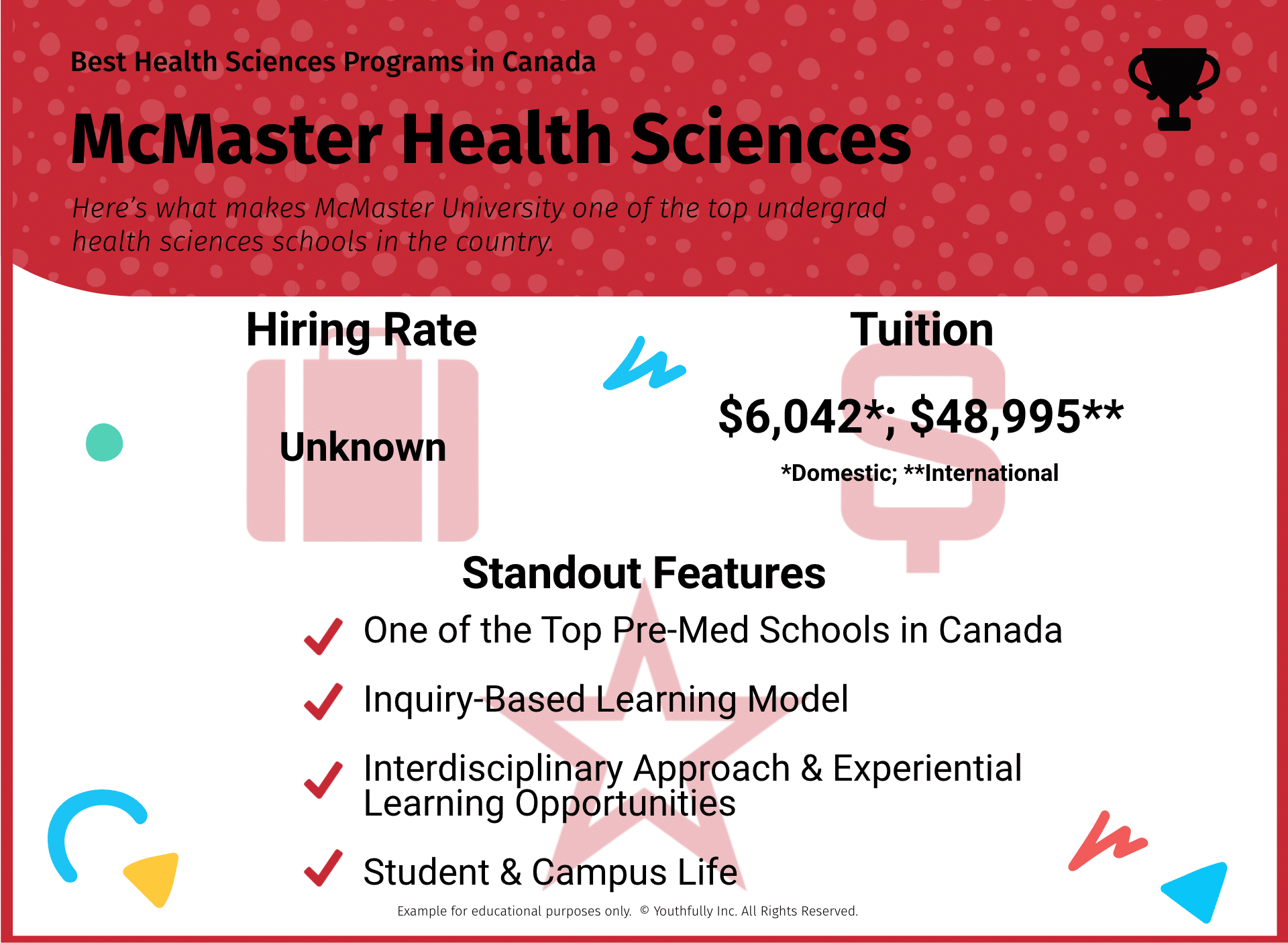
McMaster Health Sciences has been recognized as one of the best health sciences programs in Ontario and is considered to be one of the best pre-med programs in Canada.
Around 60% of BHSc McMaster graduates go on to pursue a career in medicine and get into med school.
U of T reports that the majority of their first year med school class attended McMaster (and 72% of them completed the 4-year BHSc degree). McMaster Medical Schools says that 48 out of 205 students in their class of 2022 completed their BHSc at McMaster (see more stats here).
DID YOU KNOW?: Interested in attending med school at McMaster’s Michael G. DeGroote School of Medicine? Many students tell us that completing their BHSc at McMaster made the transition a bit easier, since they were already familiar with the faculty, campus, and student life. The learning style is also similar too (more on that below), as both use a inquiry/problem-based approach to learning.
In addition to applying to med school, completing your BHSc at McMaster can open the door to a wide range of careers. Here’s a quick breakdown of the McMaster BHSc graduate statistics from 2003-2020:
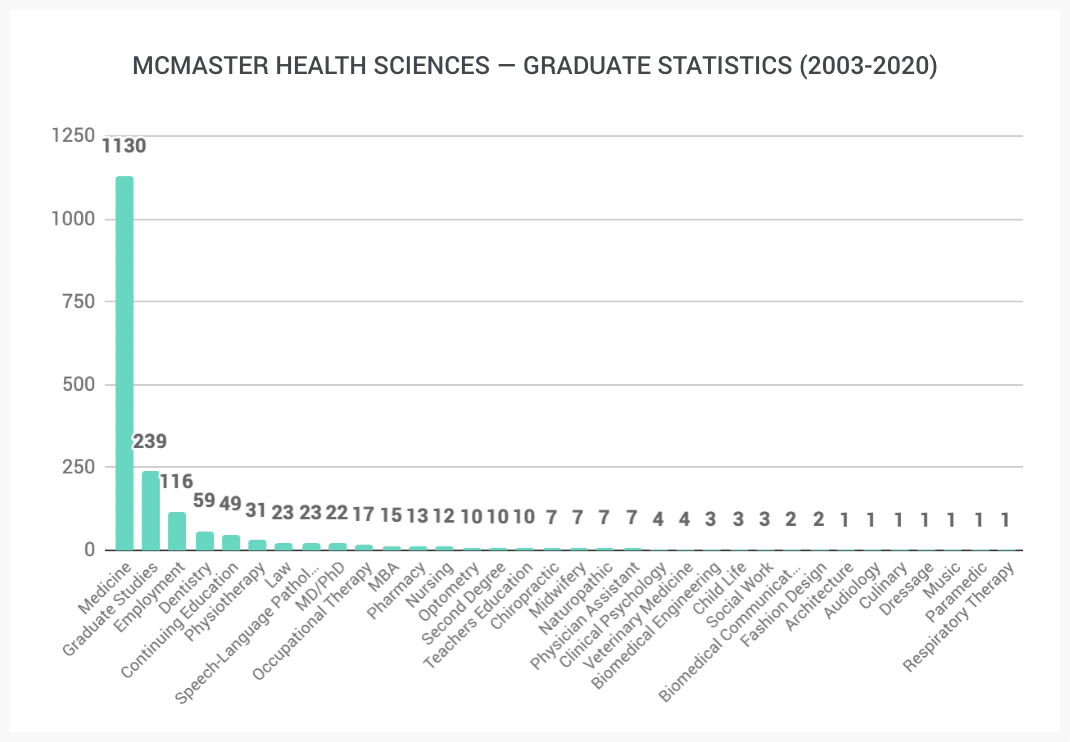
As you can see, even if you’re not 100% sure that you want to go to med school, McMaster Health Sciences will prepare you for many other careers that aren’t medicine-related.
We always recommend that students take the time to really think about what their interests are and take advantage of the flexibility of the BHSc program. The McMaster Health Sciences curriculum is designed so you can explore your interests in other disciplines, complete certificates in other programs, and/or become an expert in a specific focus area beyond first year.
This will be key as you prepare for post-graduate opportunities because the core stream lets you develop multiple competencies across various areas of health sciences. It will also give you the chance to learn about a bunch of different research areas and see what you’re most passionate about, then consider your career options based on that.
Another reason that McMaster Health Sciences is a top health sciences school is its inquiry-based approach to learning.
This unique interdisciplinary approach to learning is a student-driven learning model that emphasizes hands-on experience, collaboration, and communication. Unlike traditional university classes, where you listen to a lecture and take notes with hundreds of other students, at McMaster Health Sciences you’ll be in small classes of around 20 students, while thinking about problems, doing research, and finding an answer.
McMaster also focuses on interdisciplinary learning. You’ll use your knowledge and skills across a broad range of topics related to health, as well as health science specific issues. McMaster Health Sciences is the only program in Ontario to draw on a full range of departments in the health sciences.

David Braley Health Sciences Centre, McMaster University, Image credit
At McMaster, you’ll also get many experiential learning opportunities, like with projects and health research, community engagement, and more. For example, in Year 4, students can do a thesis or senior project where they work with a faculty member to address and analyze research questions. This gives you a chance to explore your preferred research area, learn about effective research methods, and work with a knowledgeable mentor — all of which are key for building real-world skills like problem solving, critical thinking, and teamwork.
Apart from academics, McMaster Health Sciences is a top program because of its student and campus life. Within McMaster University, there are over 300 clubs, including cultural clubs, teams, and athletics. With everything from a cinema society to a trivia club, you’ll definitely be able to find something that’s of interest.
Within the Faculty of Health Sciences itself, there’s the Bachelor of Health Sciences Society (BHSS) which is a great way to collaborate with your peers, enhance your university experience, and try something new.
Hamilton, Ontario is also a beautiful city. Called the ‘City of Waterfalls’ (with 100+ waterfalls within the city’s limits), you can go for hikes, take a short trip to Toronto or Niagara, explore the diverse restaurants, visit a museum or sporting event, and much more. There’s always something to do that’s not school-related — and that’s super important for your mental and physical health when you need a break from school stuff.
If you’re interested in finding out more about McMaster Health Sciences and their BHSc program, watch the video below!
For more info about McMaster Health Sciences, read our McMaster Health Sciences Program Guide and McMaster Health Sciences App Prep Guide, and connect with a coach to see if this program is the best fit for you.
You Might Also Like
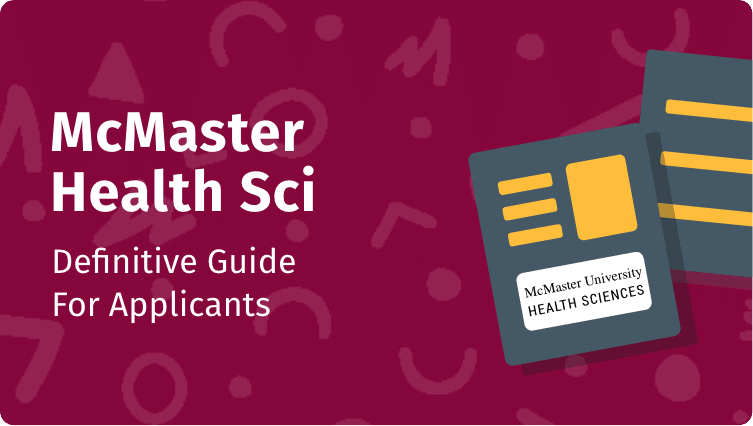
Program Guide
McMaster Health Sciences (BHSc): The Definitive Guide for Applicants (2024/2025)
If you’re applying to McMaster Health Sciences (BHSc), or you’re simply interested in learning more about the program, this guide… Read more
Queens Health Sciences BHSc (Kingston, Ontario) – Best Health Science Program in Ontario for Innovative Curriculum & Teaching Methods
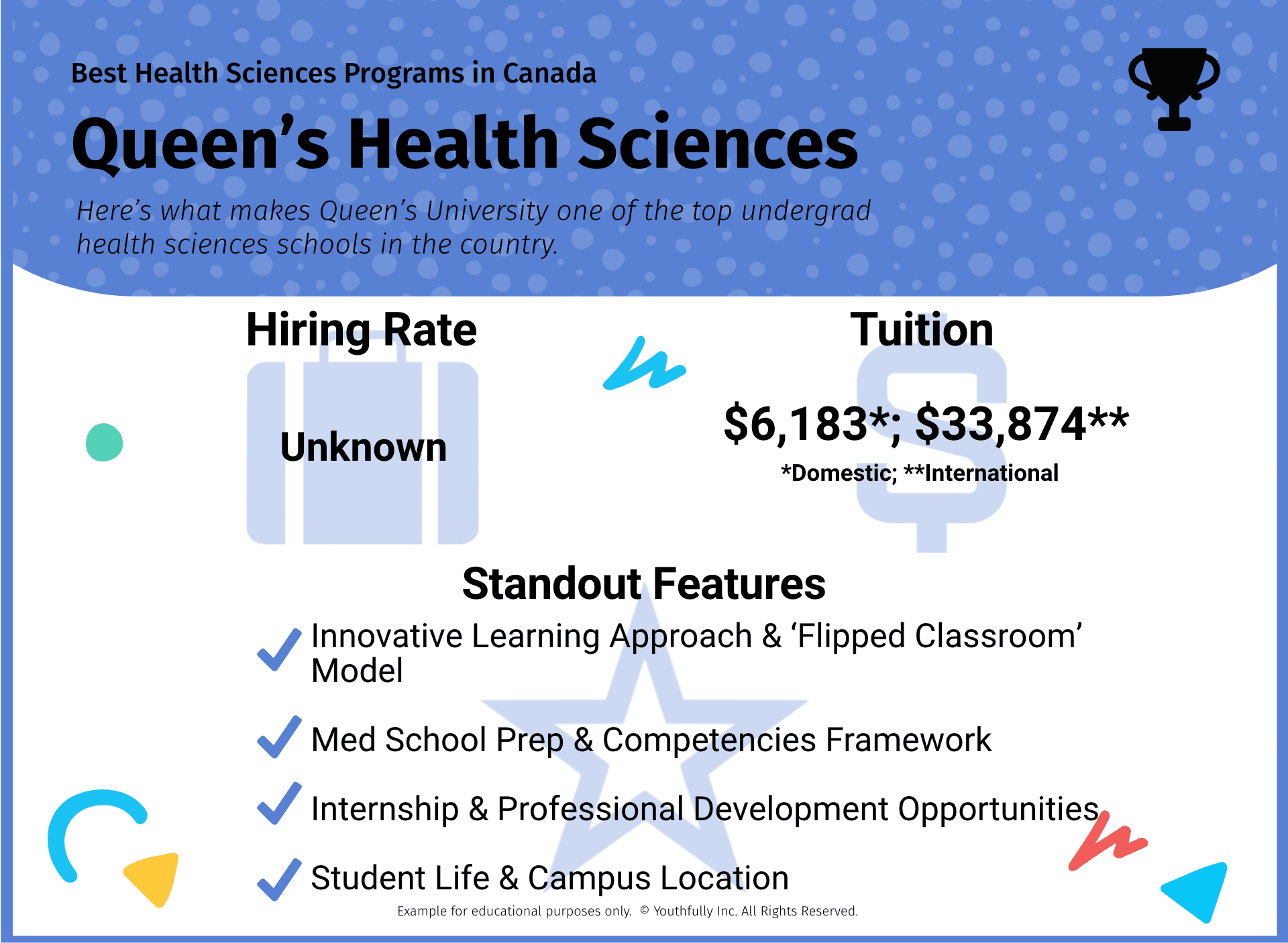
The Faculty of Health Sciences at Queen’s University is recognized as a national leader in health education. While the Queen’s BHSc program is relatively new, it has gained popularity and recognition over the last few years.
One of the reasons that Queen’s Health Sciences (BHSc) continues to rank as one of the best health sciences programs in Canada is because of its innovative curriculum and approach to learning.
Queen’s Health Sciences eliminates the traditional lecture-style of learning and uses a teaching style called the ‘flipped classroom’ (for on-campus students).
In this approach, traditional learning of going to class and then doing homework/assignments after is reversed. Instead, students review online modules and complete the associated interactive learning activities and self-assessment quizzes for each module BEFORE class. Then, in class they apply and discuss what they’ve learned already.

In this learning approach, you will discuss with your peers in small groups, while a faculty member or teaching assistant mediates the discussion, and then work through concepts using real-world examples, clinical case studies, and engaging discussions.
This is such an effective style of learning because once you do the online modules, you are reinforcing and reviewing what you’ve already learned. This makes the material easier to remember and understand.
The small group discussions are also really helpful if you have questions or if something isn’t clear. It also gets rid of a lot of feelings of isolation that we hear about so often from students, who feel like they are stuck alone in a room studying on their own for 4+ years.
Queens Health Sciences also has a good reputation for preparing students for medical and professional schools and ensuring that each student has the competencies they need to be an effective healthcare provider.
To do this, they’ve developed a competencies framework, focusing on 7 core skills:
- Collaborator: Work effectively with other health care professionals to provide safe, high-quality, patient-centered care.
- Communicator: Form relationships with patients and their families that facilitate the gathering and sharing of essential information for effective health care.
- Health Advocate: Contribute their expertise and influence as they work with communities or patient populations to improve health.
- Leader: Engage with others to contribute to a vision of a high-quality health care system and take responsibility for the delivery of excellent patient care through their activities as clinicians, administrators, scholars, or teachers.
- Scholar: Demonstrate a lifelong commitment to excellence in practice through continuous learning and by teaching others, evaluating evidence, and contributing to scholarship.
- Professional: Commit to the health and well-being of individual patients and society through ethical practice, high personal standards of behaviour, accountability to the profession and society, physician-led regulation, and maintenance of personal health.
- Content Expert: Interprets and connects health sciences information, developing a depth and breadth of knowledge of the health sciences.
All the courses and assessments in the Queen’s BHSc program teach students how to develop these competencies, giving them a significant advantage over other students, especially in the application process for healthcare professional schools.
It’s also a huge advantage because students entering a professional program are already equipped with these skills, rather than having to learn them when they enter the program, further giving them an advantage over other students.
DID YOU KNOW?: Queen’s Health Sciences (BHSc) is the only Canadian program to offer a fully online degree at a top-tier university, as well as options to combine on-campus with online learning. This flexibility is a game changer, especially for students who want to work on their own schedule and at their own pace (or aren’t physically located in Kingston). This online option has helped Queen’s Health Sciences climb the ranks of the best health sciences programs in Canada over the last few years.
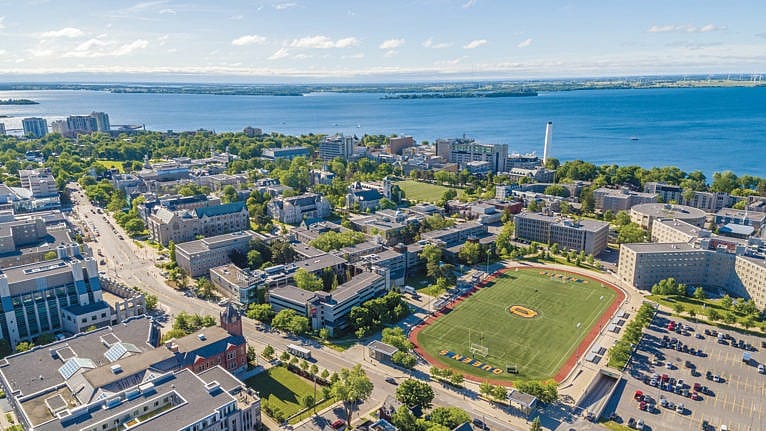
Queen’s University, image credit
Student life also makes Queens Health Sciences (BHSc) a top-tier program. There are a ton of activities and clubs on campus, like volunteer/employment opportunities, athletics, extracurricular activities, student government, and networking events. All of these will not only give you a break from your studies, but will also help you build real-world skills through experiential learning.
Within the faculty itself, there’s also the Health Sciences Society (HSS) where you can interact with your peers, make lifelong friends, and take part in some fun events and extracurriculars.
Kingston, Ontario itself is also a beautiful city, full of history and charm. It’s small enough where you can easily get around and explore, but big enough that there’s never a dull moment. There are a ton of museums and galleries, sporting events, restaurants, and nightlife to give you the break you need from your studies.
Want to see what it’s really like to be a student at Queen’s Health Sciences in the BHSc program? Check out this Day in the Life video by one of our Youthfully Insiders:
For more info about Queen’s Health Sciences, read our Queen’s Health Science Program Guide and Queen’s Health Sciences App Prep Guide.
If you’re thinking about applying to Queen’s Health Sciences, connect with a coach to see if this program is the best fit for you. We’ve helped hundreds of students improve real-world skills, stand out on their Queen’s BHSc applications, and get accepted to this top health sciences program.
You Might Also Like
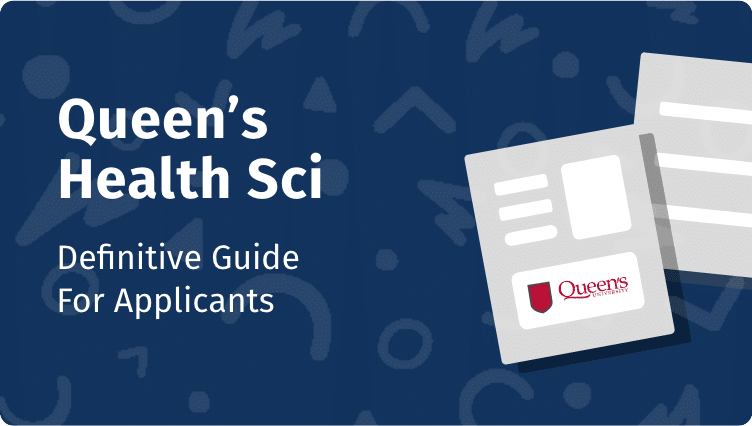
Program Guide
Queens Health Sciences: The Definitive Guide for Applicants (2024)
If you’re applying to Queen’s University for the Bachelor of Health Sciences (BHSc), or you’re simply interested in learning more… Read more
Western Health Sciences (London, Ontario) – Best Health Sciences Program in Canada for Experiential & International Learning Opportunities
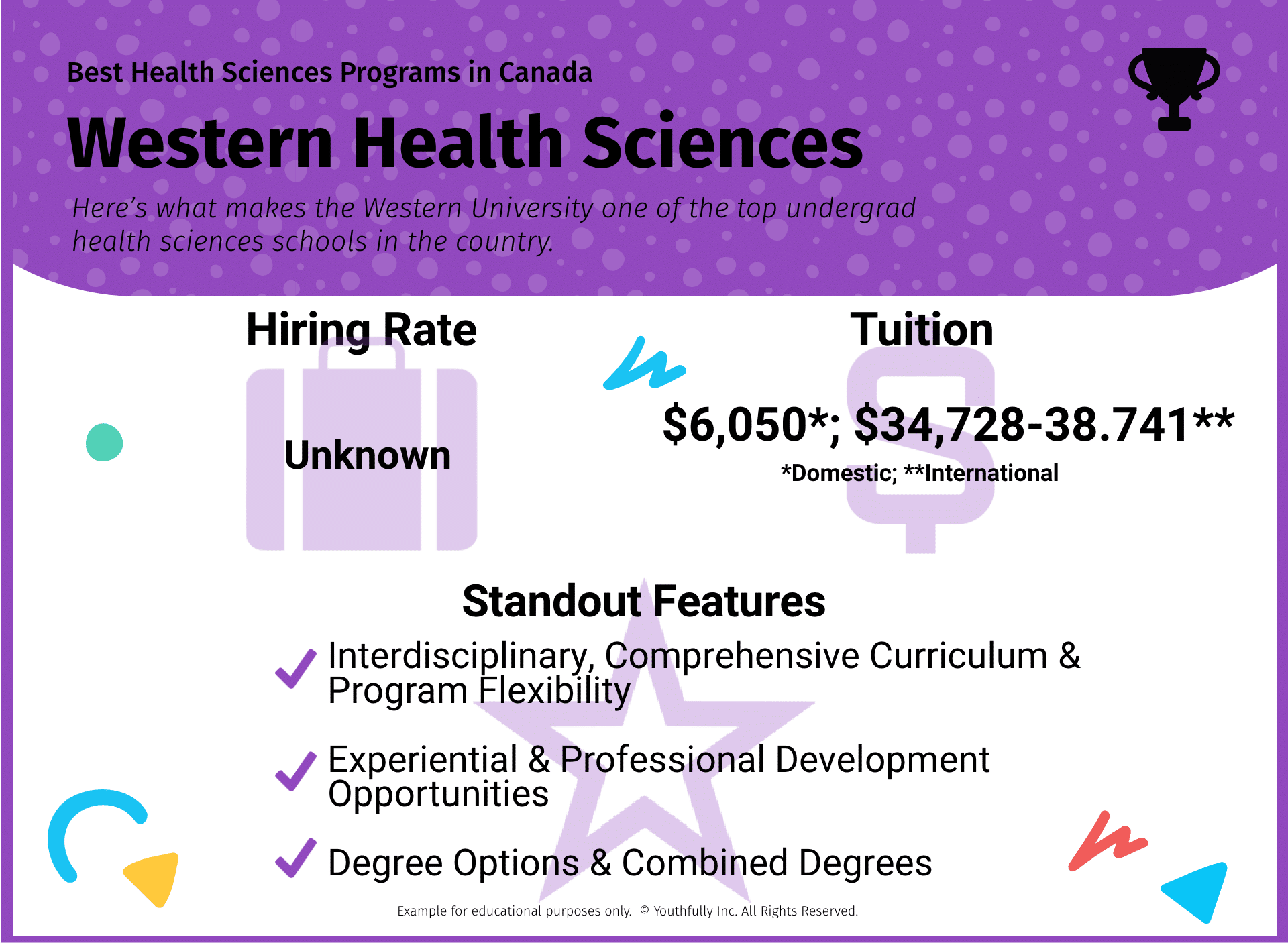
Western Health Sciences is an interdisciplinary program that teaches students about various aspects of healthcare as well as how to address various health issues.
One factor that makes Western Health Sciences tand out is that you don’t have to select your specialization (‘module’) until the end of your first year, which makes this program good if you aren’t exactly sure what area you want to focus on yet.
This program flexibility provides you with a comprehensive, foundational knowledge of many areas of the health sciences. It will also help get rid of a lot of stress in your first year because you’ll know that you have the time to explore what you’re truly passionate about and then become an expert in that area in upper years.
Another thing that makes Western Health Sciences one of the best health sciences programs in Canada is that they give you the freedom to explore other areas of interest, like philosophy, psychology, anthropology, nursing, and more. This interdisciplinary approach will open up many doors if you plan to pursue a career in medicine, rehabilitation, public health, health policy, bioethics, and more.
DID YOU KNOW?: In addition to the BHSc, Western offers a degree in Medical Sciences (BMSc). This program focuses more on the molecular cellular and systematic organization of the human body and the biological mechanisms it uses. the BMSc program is a bit different from the BHSc program because it’s more science-heavy and doesn’t always focus on broader aspects of health, such as healthcare policy, ethics, etc., like the BHSc program does. If you need support choosing the right program for you, connect with a coach.
As a Health Sciences student at Western, you’ll get the chance to apply what you’ve learned in the classroom through their various experiential learning opportunities. As a part of the curriculum, you will have to take 5 courses that integrate service to the community or international experiences (more on that below).
One option is Community Engaged Learned Courses (CEL) which is a placement or project for a community organization. This is a great chance to get hands-on experience, while learning skills you’ll need when you graduate (and building your resume). Many students have told us that this was one of the best parts of the Western Health Sciences program because they got to explore their interests while making a difference in their communities.
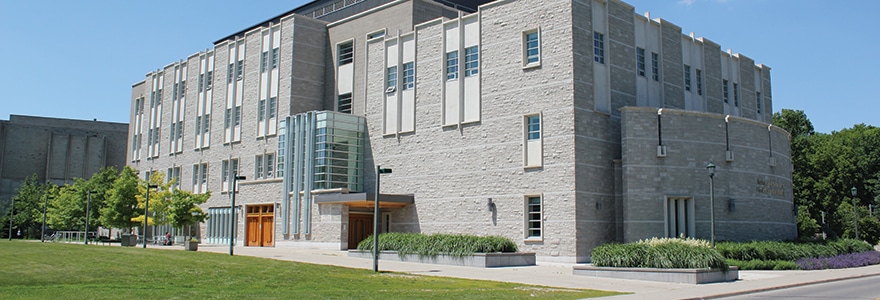
Arthur and Sonia Labatt Health Sciences Building, Western University, image credit
The School of Health Studies also offers 2 practicum opportunities where you will work with a community partner in your area of interest, either for Health Studies or Rehabilitation Sciences. There is also the Undergraduate Summer Research Internships (USRI), as well as other various internship opportunities, for upper year students where you can work in paid, career-related placements so you can get real-world experience before you graduate to increase your chances of getting into med school and/or finding a good job.
Western also takes an international approach to health sciences, and they apply this goal to their experiential learning opportunities. As mentioned above, you must take 5 courses that integrate service to the community or international experiences. The Global Skills Opportunity (GSO) is another unique experiential learning opportunity in Scandinavia (Sweden, Norway, Denmark, or Iceland). Here you’ll explore healthcare in an international context, either through coursework, internships, or an exchange.
Taking part in these unique experiences will open your eyes to different healthcare perspectives and international health systems, all while exposing you to new cultures and countries. And it will be a difference maker on your CV when you’re applying to future studies or your first job.
Western stands out as a top health sciences program because it gives you the option to build the degree that you want (and even complete more than one degree by the time you graduate). There are various degree types and module combinations you can choose from, giving you the flexibility to try out a bunch of different research areas and faculties, and explore what you’re most passionate about.
This is a gamechanger not only for exposing you to different areas and allowing you to get the full first year experience, but you’ll also build confidence that you’re making the right choices for specializations after the first year because you’ve played the field and now have all the options available to you.
A really unique thing about Western Health Sciences is that you can work on a combined degree with Ivey Business School, where you will get 2 degrees (BSc and HBA) in 5 years, which is much less time than it would take to do them consecutively.
The combined degree is a really good choice if you’re interested in the business side of healthcare, whether it be policy, analyzing data, or you want to open your own practice. It will also make you more competitive when applying to medical or professional schools when you graduate and give you a unique perspective to healthcare that other students in your class probably don’t have.
If you’re thinking about applying to Western Health Sciences, connect with a coach to see if this program is the best fit for you. We’ve helped hundreds of students improve real-world skills, stand out on their applications, and get accepted to this top health sciences program.
Find the mentor you’ve been looking for.
get a youth coach™
Waterloo Health Sciences (Waterloo, Ontario) – Best Health Sciences Program in Canada for Co-op & Professional Development
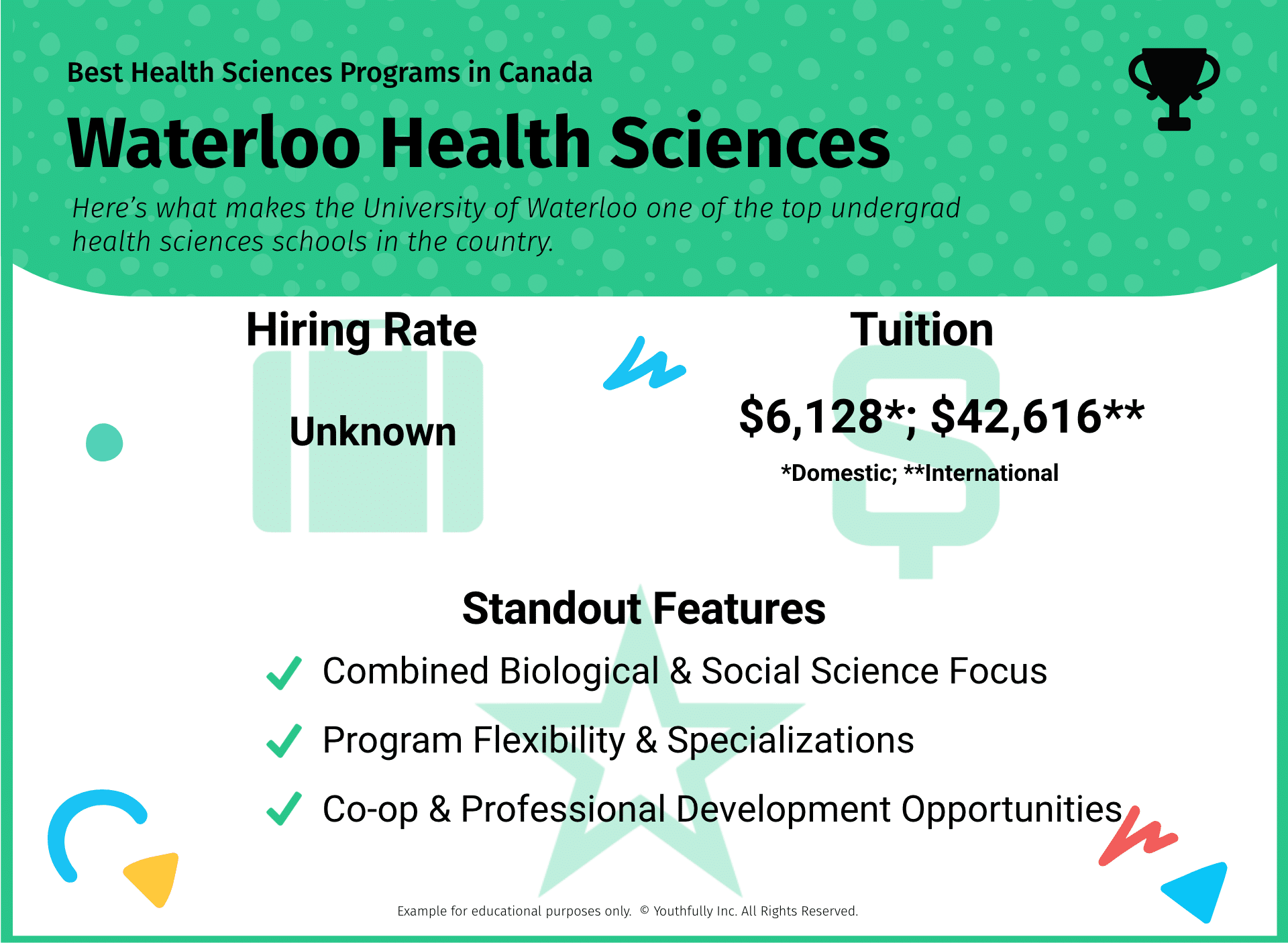
Waterloo consistently ranks as one of the best health sciences programs in Canada — and for good reason!
Unlike some other health sciences programs, Waterloo Health Sciences offers students a comprehensive science education (biology, chemistry, physiology, etc.) as well as an education in the societal factors that affect health (policy, economy, etc.).
As a Waterloo Health Sciences student, you will not only learn how to treat and prevent illness, but you’ll learn about other important aspects of health, the healthcare system and policy, and the social aspects of health.
In your first year, you’ll take a mix of courses in the Faculty of Health and the Faculty of Medicine, so you will have all the foundational knowledge you need in both areas.
This combination makes Waterloo unique because often you will see health sciences programs that focus on one thing more than the other (or you’ll have to take a Biomedical/Medical Science). Or, sometimes a health sciences program doesn’t give you all the prerequisites for med school. Since the health sciences program at Waterloo focuses on both, it’s sort of like the best of both worlds. Or, if you are set on the traditional medical-based science degree, Waterloo also has a Biomedical Sciences program.
Waterloo Health Sciences is an ideal option if you want to explore different careers in health care in addition to medicine.
DID YOU KNOW?: Before September 2022, the Health Sciences program at Waterloo was called ‘Health Studies’. Don’t get confused if you see both terms, they both refer to the same program.
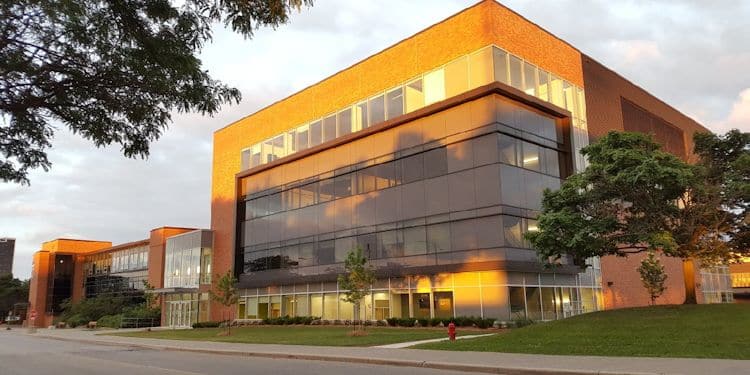
Faculty of Health, University of Waterloo, image credit
Another thing that makes Waterloo stand out as one of the best health sciences programs in Canada is that you can customize your degree and focus on the aspects of health that are most interesting to you.
By taking a Health Sciences (Studies) Major you also have the option to specialize in other areas like Health Research and Pre-Clinical.
This program also lets you take various electives, so you can take classes in other disciplines and faculties. This is definitely a positive because you can take a break from your typical health sciences courses and learn about something that’s always interested you but isn’t necessarily related to your Major, like history, art, philosophy, or anything you want!
You can also add additional focus areas to your degree (Addictions, Mental Health, and Policy; Aging Studies option; Gerontology; Health Informatics; Health Research; Pre-Clinical), as well as minors. The multidisciplinary nature of the Waterloo Health Sciences program will ensure that you have a broad understanding of various areas of health, while becoming an expert in the areas you’re most passionate about.
An aspect of this program that makes it rank as one of the best health sciences programs in Ontario (and Canada) is the experiential learning opportunities. The Waterloo Health Sciences co-op program lets you gain almost 2 years of real-world experience as you alternate between 4-month work terms and 4-month study terms. Waterloo has the largest co-op program in Canada, making it a definite highlight of this program.
Some co-op explorers that Waterloo Health Sciences students have worked with are Cancer Care Ontario, the Heart and Stroke Foundation, and the Centre for Addiction and Mental Health. These opportunities will help you build a strong network of industry professionals, while getting you experience that will help you after you graduate. Many students have also told us that their co-op opened their eyes to interests in healthcare they didn’t know they had and that it gave them more motivation and confidence.
Before you do the co-op, Waterloo will help you with professional development with their Waterloo Professional Development Program (WatPD). As a co-op student, there are mandatory courses like Career Fundamentals and Critical Reflection for Growth in the Workplace you must take before your placement, and there are also really great elective courses on topics like teamwork, problem solving, conflict resolution, and more.
Although this might seem like a lot of additional work, trust us when we say that it’s worth all the effort. The whole point of a co-op is so that you can become a well-rounded and experienced professional, and these courses will help you not only perform at your best in your placement, but they’ll teach you key lessons that you will use for the rest of your career.
DID YOU KNOW?: If you take the traditional track (i.e. don’t do the co-op), you can also develop your professional skills with the EDGE certificate program, which combines skills training workshops, career development courses, community experiences, and more. We highly recommend that you take advantage of this program because it will not only make you a better professional when you graduate, but it will make you a stronger student during your time at Waterloo.
If you’re thinking about applying to Waterloo Health Sciences, connect with a coach to see if this program is the best fit for you. We’ve helped hundreds of students improve real-world skills, stand out on their applications, and get accepted to this top health sciences program.
uOttawa Health Sciences (Ottawa, Ontario) – Top Health Sciences Program in Canada for Integrated Learning
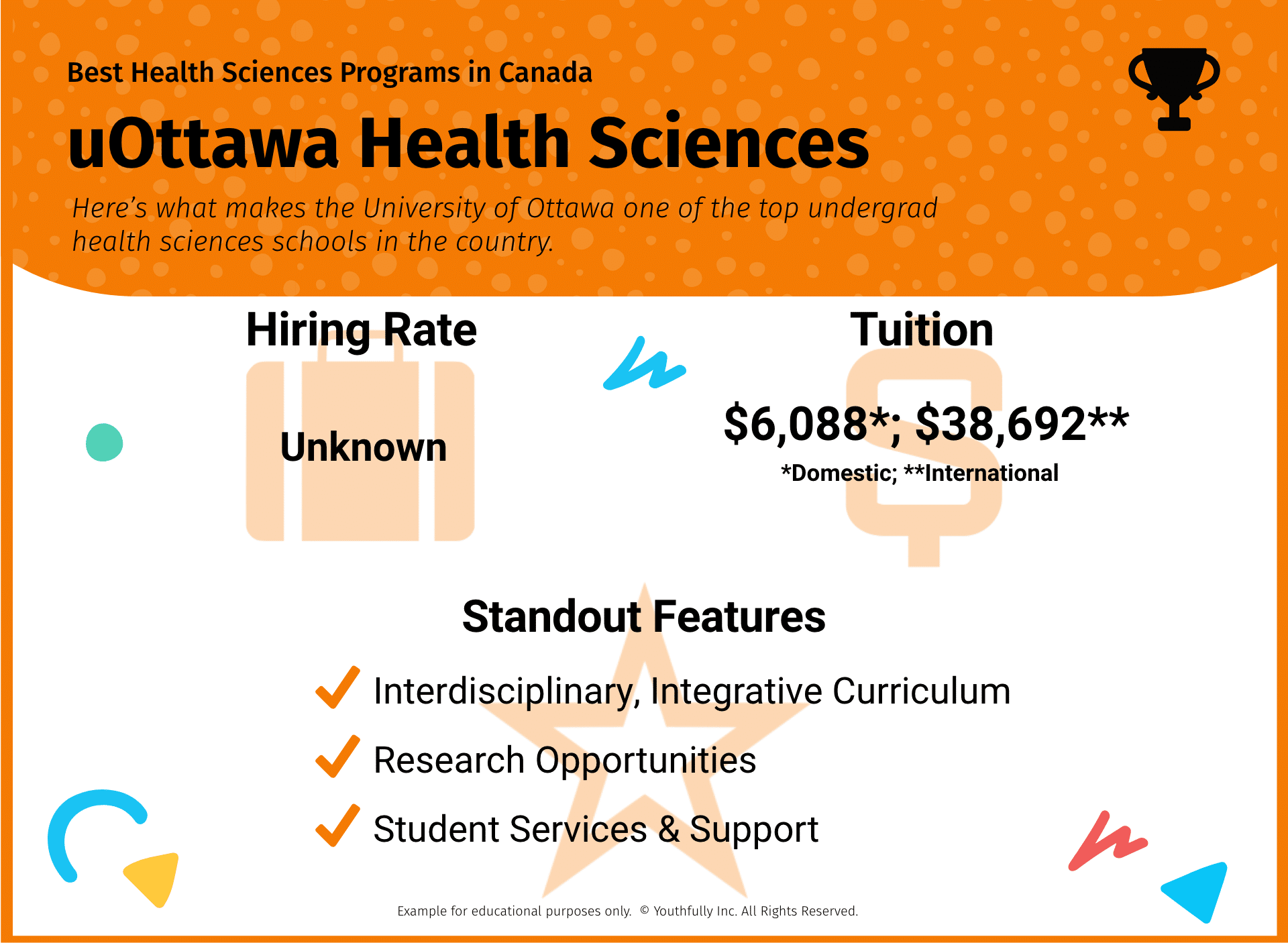
As a uOttawa Health Sciences student, you’ll learn about various approaches to studying health, as well as the basics of science in a health context.
This program is unique because it uses knowledge from various disciplines (like Population & Public Health; Technologies & Innovation; and Integrative Health Biosciences) to address various health Issues. As a BHSc student, you will choose 1 of these 3 programs as the core of your education.
Depending on what you choose, you’ll take classes in areas like health communication, computer assisted health applications, pharmacology, nutrition, etc. You can also take various electives, which is good for exploring your interests and gaining knowledge in other areas outside health sciences.
In addition to gaining a foundational knowledge about the biosciences, you will build analytical and research skills so you can understand how factors like society and environment can affect health.
This interdisciplinary curriculum makes the uOttawa Health Sciences program so unique because you learn so much beyond human systems and the human body. It’s a good choice if you aren’t completely sure what your interests are and what career you want to pursue. As a BHSc student at the University of Ottawa, you’ll have the tools and skills you need to pursue a variety of careers in the healthcare industry.
DID YOU KNOW?: If you are planning on applying to uOttawa Med School, remember that uOttawa Med School requirements are NOT included in the BHSc program. However, you can use your electives to add them in if this is the career you want to pursue. This isn’t to say that you can’t apply to med school if you’re in this program, you just have to plan your courses carefully to make sure that you’ve covered all the requirements.
Ottawa also offers a Biomedical Science program in their Faculty of Science. This program is different from the BHSc program, as it focuses more on human and animal anatomy, structures and functions, along with chemistry, math, genetics, etc. In upper years, you’ll choose between Bioanalytical science, Cellular and Molecular Medicine, Biostatistics, Medicinal Chemistry, or Neuroscience. This program also has a co-op (the Health Sciences program doesn’t have a co-op). It also has all the requirements you’ll need to apply to the uOttawa Med School. If you need some help deciding which program is best for you based on your interest and career goals, connect with a coach for support.
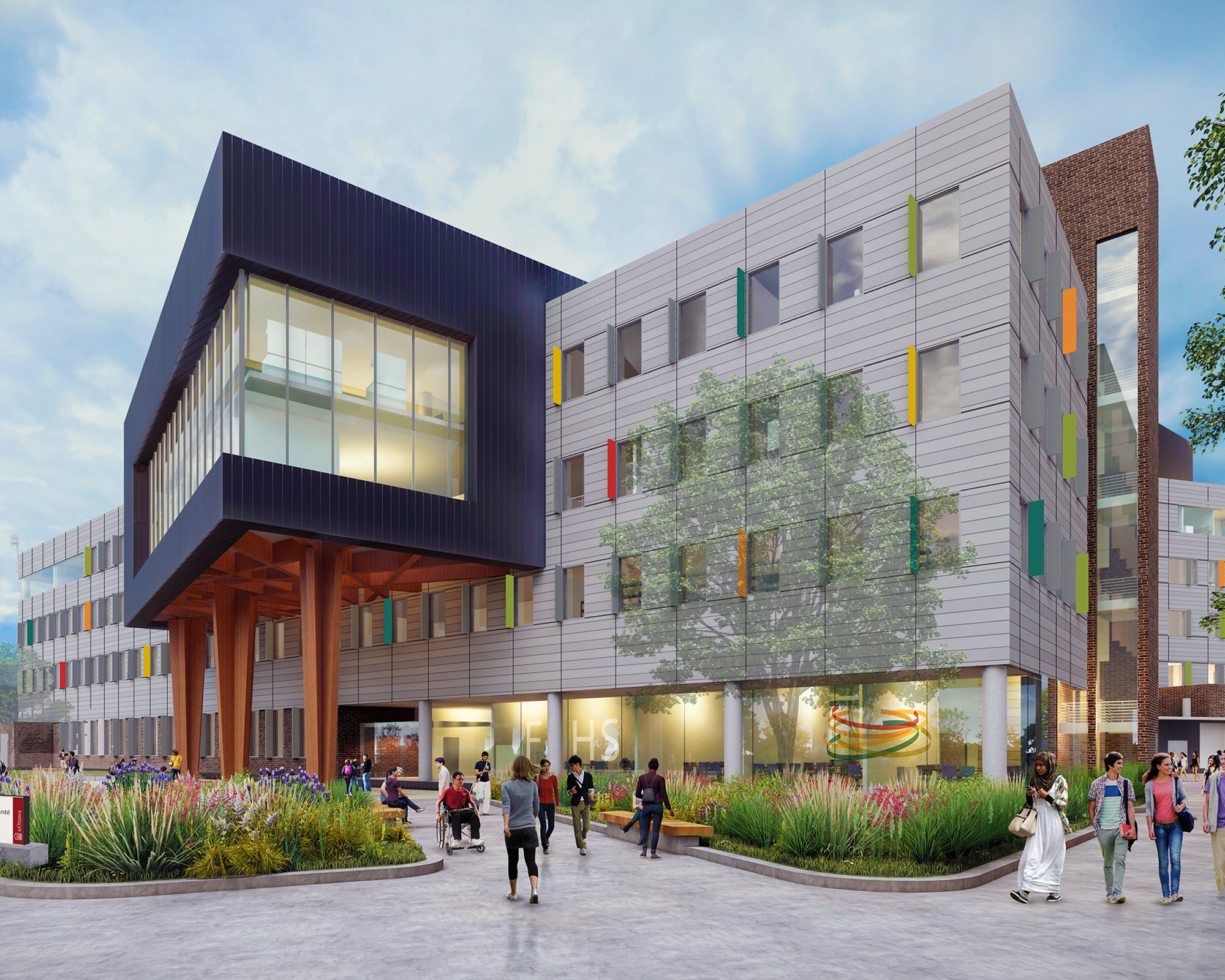
Faculty of Health Sciences at River Campus, University of Ottawa, image credit
With research being at the heart of the uOttawa Health Sciences program, there are also various opportunities for you to expand your research interests through projects and fieldwork. This is a good option since there is no co-op at uOttawa.
The Undergraduate Research Opportunities Program (UROP) is a good opportunity to learn about research methodologies in your field of interest while working under the mentorship of a faculty member. This part-time internship is especially good if you’re thinking about pursuing graduate studies or a career in research.
Within the Faculty of Health Sciences itself, there are various opportunities to explore your research interests, as well as get the funding and support you need (ICYMI the Faculty of Health Sciences got $11 million in research funding in 2021!).
The BHSc program also has opportunities to conduct research thesis projects. The uOttawa Health Sciences program curriculum is also structured in such a way that you’ll get significant training in health research methodologies through courses in statistics, quantitive and qualitative approaches to research, and more, so you can apply your research across various disciplines.
Another aspect that makes the Health Sciences program at uOttawa stand out is the university’s focus on student support. It can be really difficult to adapt to university and meet the demands that are expected of you. At uOttawa, there are various ways that you can get support and make health and wellness a priority, like activities and workshops, their Wellness Lounge, community engagement opportunities, and mental health counseling.
There are also clubs like the Health Sciences Student Association where you can make friends, go to networking events, and really feel like you’re part of a community. No matter what you need, there is always someone there to support you — and this is key for your mental health and wellbeing.
If you’re thinking about applying to uOttawa Health Sciences, connect with a coach to see if this program is the best fit for you. We’ve helped hundreds of students improve real-world skills, stand out on their applications, and get accepted to this top health sciences program.
You’ve Got a Dedicated Coach in Your Corner
For over a decade, we have worked with thousands of students to help them achieve more than they ever thought possible.
Our coaches have a strong success rate supporting students as they apply to leading health sciences programs like those mentioned above, among other top university programs.
Our 1-on-1 Youth Coaching fills that gap that most high schools miss. We can help you build self-awareness through probing questions and assessments, set bigger goals to elevate your extracurriculars and future career plans, and improve skills that matter on supplementary applications, such as interviewing, written communication, critical thinking, and creativity.
We use a coaching methodology, called ‘full student’ development, that’s been proven to increase your chances of admission to top-tier universities and obtaining competitive jobs/internships.
So, what are you waiting for? Fulfill your post-secondary potential with the mentorship and coaching you’ve always wanted! 🙂
IMPORTANT: Want to share information and/or images from this resource on your own website, blog, article, etc.? Please ensure you reference content of any kind published by Youthfully Inc., in whole or in part, using the following statement: (1) Our Organization (Youthfully Inc.); (2) The title of our content/resource; and (3) the URL to our webpage where the content was originally posted. For example: “Sourced from: Youthfully Inc., “Best Health Sciences Programs in Canada 2024 (Undergraduate Programs)”,’ https://youthfully.com/best-health-sciences-programs-in-canada.” Not doing so is an infringement of copyright and is illegal. We spend significant time developing resources for students, so please take a few seconds to ensure they are referenced properly.
Disclaimer: While the information in this blog is considered to be true and correct at the date of publication, and although our team makes every attempt to ensure that the information is accurate and vetted by university staff, Youthfully is not in any way liable for the accuracy of any information printed and stored or in any way interpreted and used by a user.


